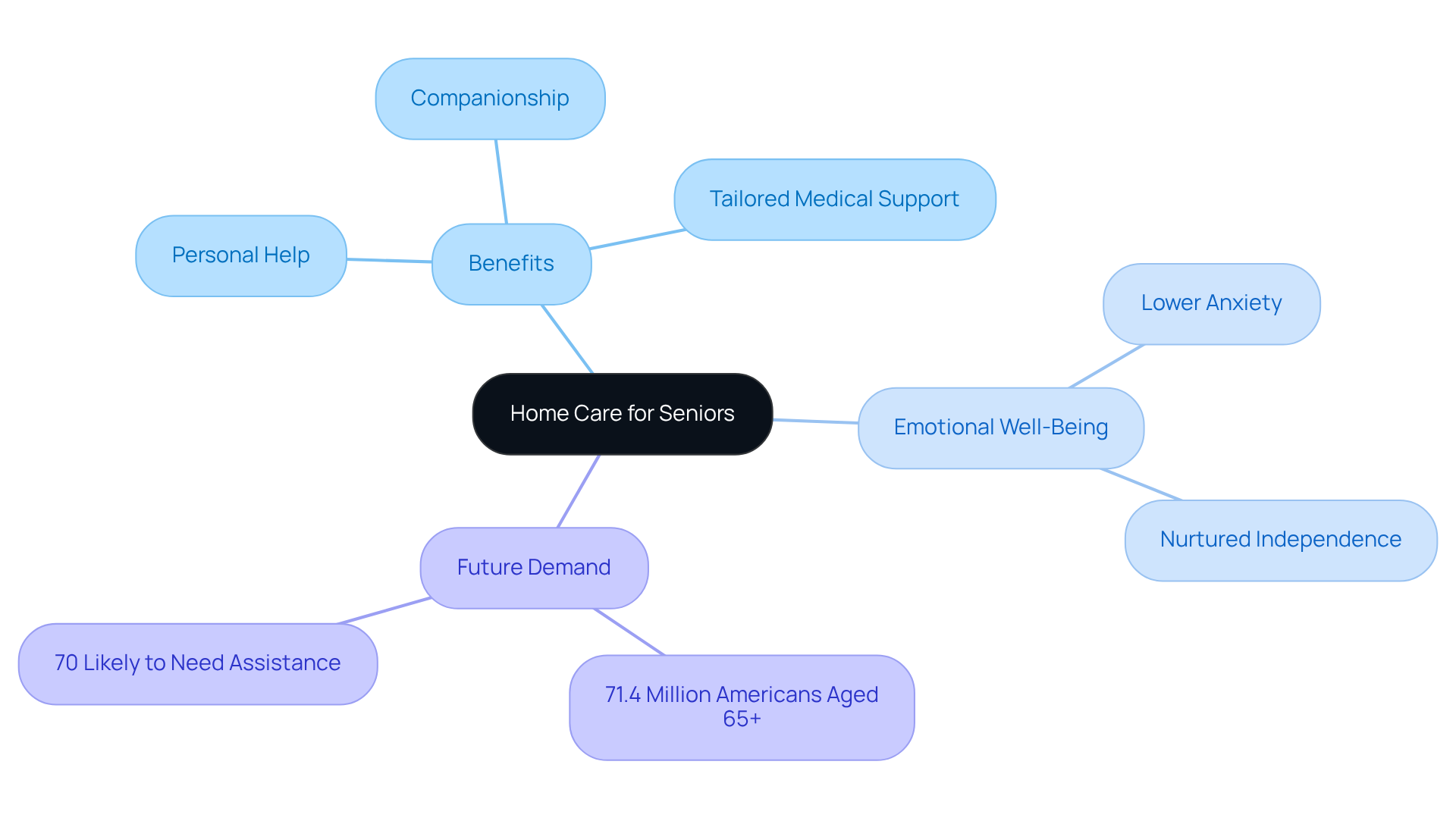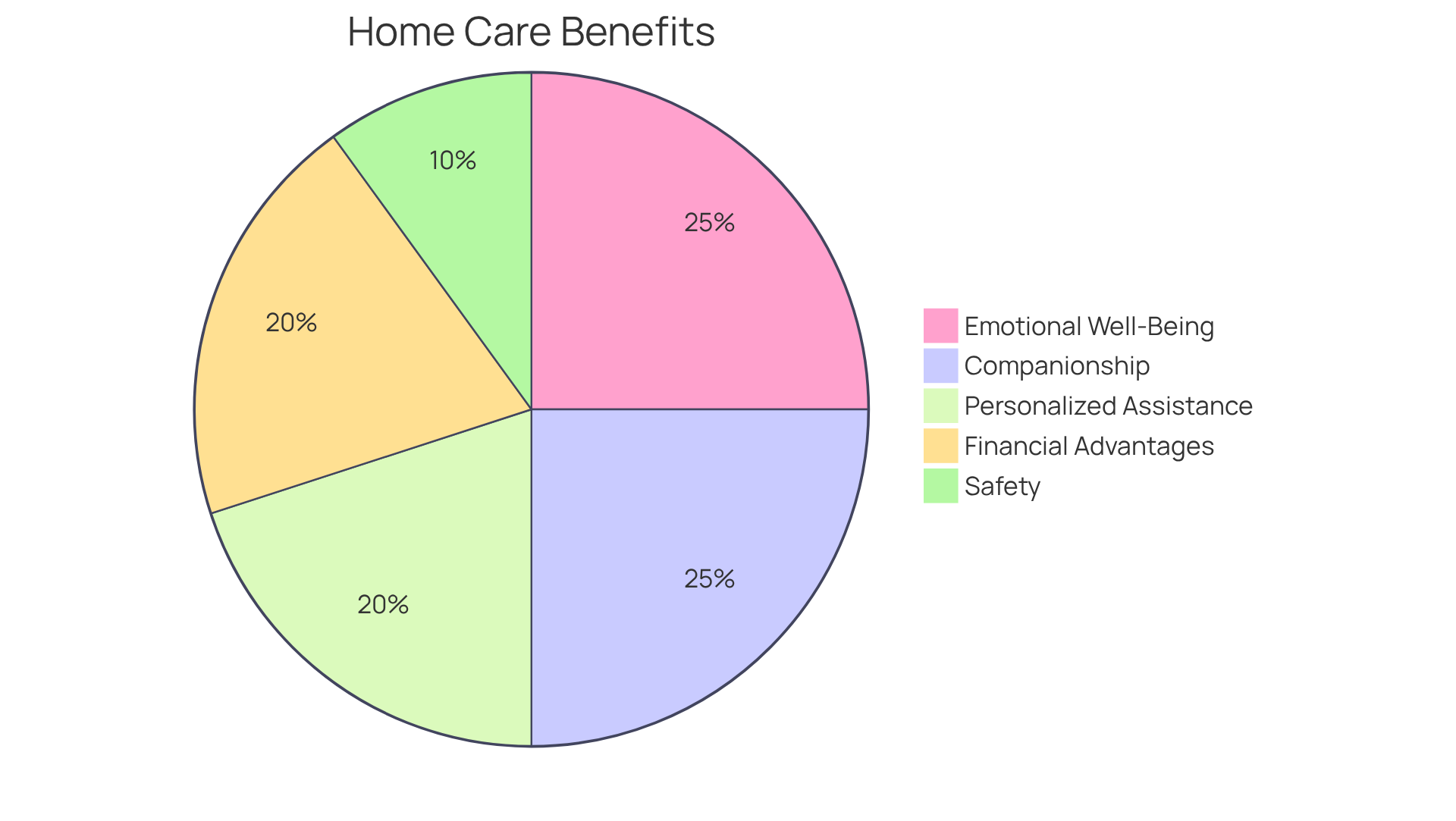Overview
Home care for seniors brings a wealth of benefits. It allows older adults to maintain their independence, receive personalized support, and enhance their emotional well-being—all within the comfort of their own homes. Imagine the peace of mind that comes from knowing your loved one is in a familiar environment, surrounded by cherished memories.
Tailored care plans play a crucial role in this journey. They not only improve the quality of life but also help reduce feelings of loneliness and anxiety. This personalized approach makes home care an invaluable resource for older adults as they navigate the challenges of aging.
Consider the stories of families who have embraced home care. They often share how the compassionate support provided has transformed their loved ones’ lives, allowing them to thrive emotionally and physically. It’s heartwarming to see how a little extra help can make such a significant difference.
In the end, home care isn’t just about assistance; it’s about fostering connections and ensuring that seniors feel valued and understood. With the right support, they can continue to lead fulfilling lives, surrounded by the love and familiarity of home.
Introduction
As our population of seniors continues to grow, it’s essential to take a moment to reflect on how we can best support their needs as they age. Many families find themselves grappling with the emotional weight of ensuring their loved ones receive the care they deserve. Home care stands out as a vital solution, offering personalized assistance that allows older adults to maintain their independence while receiving essential support in the comfort of their own homes.
Yet, with the rising demand for these services, families often wonder: how can they effectively implement home care strategies that truly enhance the quality of life for their loved ones? This article explores the key benefits of home care for seniors, providing practical steps for establishing a successful home care plan. Together, we can navigate this journey, ensuring that our cherished seniors feel valued, supported, and loved.
Define Home Care and Its Importance for Seniors
In-home support highlights the benefits of home care for seniors by offering a range of services right in the comfort of an elderly person’s home, helping them maintain their independence while receiving assistance with daily tasks. This includes personal help, companionship, and tailored medical support, all designed to meet individual needs.
The significance of domestic support for older adults shines through its ability to create a familiar and comforting environment, which is vital for emotional well-being. Research indicates that older adults who receive in-home assistance experience significantly lower levels of anxiety and depression compared to those in institutional settings.
Moreover, the benefits of home care for seniors include personalized support plans that not only enhance quality of life but also nurture a sense of independence, allowing seniors to thrive in their own spaces. By addressing both physical and emotional needs, the benefits of home care for seniors become an invaluable resource for promoting mental health and overall well-being among the elderly.
With an estimated 71.4 million Americans aged 65 and older expected by 2029, and around 70% of this group likely to require some form of assistance during their lives, the demand for domestic support services is more crucial than ever. As Tia Walker beautifully expressed, “Caregiving often calls us to lean into love we didn’t know possible,” reminding us of the deep emotional bonds that caregivers cultivate.
Explore Key Benefits of Home Care for Seniors
The benefits of home care for seniors play a vital role in preserving the independence and dignity of older adults, enabling them to remain in the comfort of their own homes. This arrangement fosters a sense of control and significantly enhances the benefits of home care for seniors, improving their quality of life. Research shows that older adults receiving in-home health services often experience the benefits of home care for seniors, leading to improved mental and emotional wellness. Familiar environments can alleviate stress and anxiety, leading to better health outcomes. In fact, over 40% of seniors report feeling lonely regularly, underscoring the importance of companionship in combating isolation.
Personalized assistance is a cornerstone of home support services, tailored to meet the unique needs of each individual. This customization ensures that support is relevant and effective, addressing specific health concerns and preferences. Caregivers can assist with daily living activities while also providing companionship, which is crucial in alleviating feelings of loneliness and isolation that many seniors face.
From a financial perspective, residential support is often more economical than nursing facilities or assisted living establishments. The typical yearly expense of residential healthcare is over 30% lower than that of a shared room in a nursing facility, making it a practical choice for families, especially those on fixed incomes.
Moreover, the benefits of home care for seniors enhance emotional well-being by allowing them to remain in a familiar setting, which is associated with reduced feelings of helplessness and improved mental wellness. Regular social interaction with caregivers can boost cognitive function and mitigate risks associated with isolation, such as memory loss and increased dementia risk. As one caregiver noted, “one of the most significant benefits of home care for seniors is that it allows older adults to maintain their independence.”
Family involvement is a significant aspect among the benefits of home care for seniors. It encourages active participation in the care process, nurturing stronger connections and support networks. Frequent updates and communication from at-home health professionals help families stay informed about their loved one’s well-being, providing peace of mind.
Safety and comfort are essential in residential support environments. Seniors receive assistance while surrounded by their belongings and loved ones, enhancing their sense of security. Additionally, domestic support services offer flexibility, allowing for adjustments as needs change, ensuring continuous assistance that adapts with the individual.
In summary, the benefits of home care for seniors enable older adults to maintain their independence while receiving the tailored support they need, ultimately leading to a more fulfilling and dignified life.
Implement Effective Home Care Strategies for Seniors
-
Assess Needs: Start by understanding the unique needs of the senior, including their physical, emotional, and social requirements. This assessment is crucial in determining the benefits of home care for seniors. With projections indicating that by 2029, about 71.4 million Americans aged 65 and older will require assistance, grasping these needs is vital.
-
Create a Support Plan: Craft a personalized support strategy that details the necessary services, how often assistance is needed, and any specific preferences or routines. Research shows that tailored treatment plans can significantly reduce emergency room visits and improve overall health management for chronic conditions, emphasizing the benefits of home care for seniors as essential for effective support.
-
Choose a Caregiver: Find a qualified individual who resonates with the elder’s personality and support needs. Consider conducting interviews to ensure a good match, fostering a nurturing and comfortable environment for the senior.
-
Incorporate Technology: Leverage technology to enhance support, such as medication reminders, health monitoring devices, and communication tools for family updates. These tools can improve service efficiency and keep family members connected.
-
Encourage Independence: Design activities that promote independence, like meal preparation or light housekeeping, while ensuring safety. This approach not only enhances the elder’s quality of life but also illustrates the benefits of home care for seniors by nurturing a sense of purpose.
-
Regular Check-Ins: Schedule consistent meetings with the caregiver to discuss the elder’s progress and any necessary adjustments to the care plan. Care plans should be reviewed annually or more often if there are changes in health or medications, ensuring they remain effective.
-
Engage Family Support: Involve family members in the caregiving process to provide emotional support and help the elderly individual feel connected and valued. Including family in planning discussions is crucial for enhancing the overall well-being of the elderly, as it helps address feelings of loneliness and isolation, illustrating the benefits of home care for seniors. Notably, 75% of seniors would prefer to age in place if possible, underscoring the importance of personalized care plans that support this wish.
Conclusion
The exploration of home care for seniors highlights its essential role in fostering independence and enhancing the quality of life for older adults. By offering personalized support in a familiar environment, home care not only meets physical needs but also plays a significant part in emotional well-being. This approach allows seniors to flourish in their own spaces, nurturing a sense of dignity and control over their lives.
Key benefits emphasized throughout the article include:
- Emotional support that alleviates loneliness
- Financial advantages compared to institutional care
- Flexibility that home care provides as needs change
Effective home care strategies—like assessing individual needs, crafting personalized support plans, and involving family members—are vital in ensuring that seniors receive the tailored assistance they deserve. These insights reveal that home care is more than just a service; it’s a pathway to a more fulfilling life for many elderly individuals.
Recognizing the significance of home care services is crucial as our aging population continues to grow. By embracing these strategies and understanding the benefits of home care for seniors, families can make informed decisions that truly enhance their loved ones’ quality of life. As the demand for these services increases, prioritizing home care will not only address the practical needs of seniors but also honor their desire to age in place with dignity and support.
Frequently Asked Questions
What is home care for seniors?
Home care for seniors refers to a range of services provided in the comfort of an elderly person’s home, including personal help, companionship, and tailored medical support, aimed at helping them maintain their independence while receiving assistance with daily tasks.
Why is home care important for seniors?
Home care is important for seniors because it creates a familiar and comforting environment that is vital for emotional well-being. It helps reduce anxiety and depression levels compared to institutional settings and allows seniors to thrive in their own spaces.
How does home care benefit the emotional well-being of seniors?
Home care benefits the emotional well-being of seniors by providing personalized support that enhances their quality of life and nurtures a sense of independence, addressing both physical and emotional needs.
What types of services are included in home care for seniors?
Services included in home care for seniors can encompass personal assistance, companionship, and tailored medical support, all designed to meet individual needs.
What is the projected demand for home care services in the coming years?
With an estimated 71.4 million Americans aged 65 and older expected by 2029, and around 70% of this group likely to require assistance during their lives, the demand for home care services is anticipated to be significant.
How does home care support mental health among the elderly?
Home care supports mental health among the elderly by providing a comfortable and familiar environment, which reduces feelings of anxiety and depression, contributing to overall well-being.




